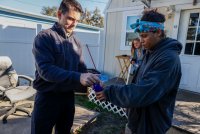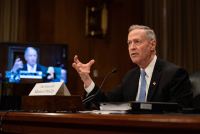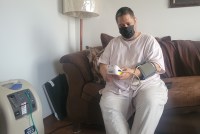Latest KFF Health News Stories
The Burden of Getting Medical Care Can Exhaust Older Patients
It’s estimated that an older patient can spend three weeks of the year getting care — and that doesn’t count the time it takes to arrange appointments or deal with insurance companies.
As AI Eye Exams Prove Their Worth, Lessons for Future Tech Emerge
With artificial intelligence in health care on the rise, eye screenings for diabetic retinopathy are emerging as one of the first proven use cases of AI-based diagnostics in a clinical setting.
Overdosing on Chemo: A Common Gene Test Could Save Hundreds of Lives Each Year
The FDA and some oncologists have resisted efforts to require a quick, cheap gene test that could prevent thousands of deaths from a bad reaction to a common cancer drug.
At Stake in Mifepristone Case: Abortion, FDA’s Authority, and Return to 1873 Obscenity Law
The end goal for a conservative Christian group’s mifepristone case before the Supreme Court: a de facto nationwide abortion ban.
A Paramedic Was Skeptical About This Rx for Stopping Repeat Opioid Overdoses. Then He Saw It Help.
For years, addiction response teams have traveled around Florida to connect people who have overdosed with resources and recovery centers. Now, a handful have a new tool in their kit: buprenorphine, which can help prevent the cravings and withdrawal symptoms that lead to more drug use.
A Mom’s $97,000 Question: How Was Her Baby’s Air-Ambulance Ride Not Medically Necessary?
There are legal safeguards to protect patients from big bills like out-of-network air-ambulance rides. But insurers may not pay if they decide the ride wasn’t medically necessary.
After Appalachian Hospitals Merged Into a Monopoly, Their ERs Slowed to a Crawl
Ballad Health was granted the nation’s largest state-sanctioned hospital monopoly in 2018. Since then, its emergency rooms have become more than three times as slow.
California’s Expanded Health Coverage for Immigrants Collides With Medicaid Reviews
A state policy to extend Medi-Cal to qualified Californians without legal residency is running up against a federal requirement to resume eligibility checks. The redetermination process is causing many Latinos, who make up a majority of Medi-Cal beneficiaries, to be disenrolled.
Move to Protect California’s Indoor Workers From Heat Upended by Cost Questions
A years-long process that would have created heat standards for California workers in warehouses, steamy kitchens, and other indoor job sites catapulted into chaos Thursday when Gov. Gavin Newsom’s administration pulled its support. Regulators, saying they felt “blindsided,” approved the regulation anyway. It’s unclear what happens next.
KFF Health News' 'What the Health?': The ACA Turns 14
Saturday marks the 14th anniversary of the still somewhat embattled Affordable Care Act. Health and Human Services Secretary Xavier Becerra joins host Julie Rovner to discuss the accomplishments of the health law — and the challenges it still faces. Also this week, Alice Miranda Ollstein of Politico, Tami Luhby of CNN, and Mary Agnes Carey of KFF Health News join Rovner to discuss what should be the final funding bill for HHS for fiscal 2024, next week’s Supreme Court oral arguments in a case challenging abortion medication, and more. Plus, for “extra credit,” the panelists suggest health policy stories they read this week they think you should read, too.
Social Security Chief Testifies in Senate About Plans to Stop ‘Clawback Cruelty’
Commissioner Martin O’Malley testifies to two Senate panels that his agency will stop the “injustices” of suspending people’s monthly benefits to recover alleged overpayments. The burden will be on the Social Security Administration to prove the beneficiary was to blame.
Rapid Rise in Syphilis Hits Native Americans Hardest
With U.S. syphilis rates climbing to the worst level in seven decades, public health experts and the federal Indian Health Service are scrambling to detect and treat the disease in Native American communities, where babies are infected at a higher rate than in any other demographic.
Georgia’s Medicaid Work Requirements Costing Taxpayers Millions Despite Low Enrollment
Republican Gov. Brian Kemp’s Georgia Pathways to Coverage program has seen anemic enrollment while chalking up millions in start-up costs — largely in technology and consulting fees. Critics say the money’s being wasted on a costly and ineffective alternative to Obamacare’s Medicaid expansion.
Needle Pain Is a Big Problem for Kids. One California Doctor Has a Plan.
The pain and trauma from repeated needle sticks leads some kids to hold on to needle phobia into adulthood. Research shows the biggest source of pain for children in the health care system is needles. But one doctor thinks he has a solution and is putting it into practice at two children’s hospitals in Northern California.
Watch: Many Americans Are Unaware of HIV Prevention Medication
Some Americans mistakenly believe medication to prevent HIV transmission through sex is just for certain groups such as gay men, but anyone who’s at risk for contracting HIV through sex could benefit.
Amid Mental Health Staffing Crunch, Medi-Cal Patients Help One Another
Peer leaders can help ease the shortage of mental health providers and build trust through shared experiences, state health officials say. In 2022, California started allowing counties to use Medicaid dollars to pay them for their work.
As money flows to abortion rights initiatives in states, some donors focus on where anger over the “Dobbs” ruling could propel voter turnout and spur Democratic victories up and down the ballot, including in key Senate races and the White House.
Health Workers Fear It’s Profits Before Protection as CDC Revisits Airborne Transmission
Four years since the covid pandemic emerged, health care workers want rules that protect them during outbreaks. They worry the CDC is repeating past mistakes as it develops a crucial set of guidelines for hospitals, nursing homes, prisons, and other facilities that provide health care.
Covid and Medicare Payments Spark Remote Patient Monitoring Boom
Demand for help monitoring patients’ vital signs remotely has taken off since a Medicare change in 2019. Dozens of companies now push the service to help overburdened primary care doctors — and as a revenue stream. But some policy experts say its growth has outpaced oversight and evidence of effectiveness.
When Copay Assistance Backfires on Patients
Drugmakers offer copay assistance programs to patients, but insurers are tapping into those funds, not counting the amounts toward patient deductibles. That leads to unexpected charges. But the practice is under growing scrutiny.


























